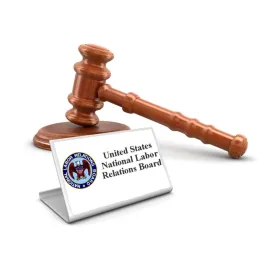On November 20, 2019, the National Labor Relations Board’s (NLRB) Office of the General Counsel granted an appeal filed by the National Right to Work Legal Defense Foundation (NRTWLDF) on behalf of a hotel housekeeper in Seattle finding that a neutrality agreement arguably violated the National Labor Relations Act (NLRA) and that the hotel’s recognition of the union pursuant to that agreement was unlawful.
In this case, in March 2018, the employer opened a new hotel in downtown Seattle. Approximately a month after the hotel’s opening, the employer announced to its new employees in a letter that they were subject to an organizing agreement with Unite Here Local 8. The letter stated that the employer will (1) grant union organizers access to the hotel to meet and solicit employees and (2) will “provide the Union with a list of all [employees’] names, job classifications, departments, phone numbers, and home addresses.” The employer provided the union with this assistance in collecting authorization cards from employees.
On May 17, 2018, the employer recognized Unite Here to be its employees’ exclusive representative based on the union’s authorization cards. One of the employer’s housekeepers, with free legal assistance provided by the NRTWLDF, filed an unfair labor practice (ULP) charge. On December 17, 2018, Region 19 of the NLRB dismissed the ULP charge and concluded that “the investigation revealed no evidence that the agreement entered into by the Employer and the Union violates current Board law.” This appeal followed in January 2019.
The NRTWLDF challenged this neutrality agreement on narrow grounds, seeking to extend the “more than ministerial aid” standard commonly used in decertification drives to the original union organizing in this case. The NRTWLDF argued that providing the union with lists of employees’ names, addresses, and telephone numbers and granting non-employees access to the hotel property to solicit cards would violate the “more than ministerial aid” standard if the hotel had done the same thing in support of a decertification drive, thus creating a double standard. Therefore, under a “what’s good for the goose is good for the gander” argument, those actions also tainted the union authorization cards and, in turn, invalidated recognition of the union.
NLRB General Counsel Peter B. Robb reversed the dismissal of the ULP charge and, absent settlement, ordered the issuance of a complaint and a hearing before an administrative law judge. The decision states the following:
The Employer arguably violated Sections 8(a)(1) and (2) of the Act by entering into and maintaining a neutrality agreement with the Union that provides for more than ‘ministerial aid’ to the Union during its organizing campaign. It was further concluded that the Union violated Section 8(b)(1)(A) by accepting this aid and support from the Employer. Finally, we concluded that the Employer unlawfully recognized, and the Union accepted such unlawful recognition, in violation of Sections 8(a)(1) and (2) and 8(b)(1)(A) of the Act respectively.
Key Takeaways
Granting the appeal and directing the issuance of a complaint is likely not the end of this story, but it is a noteworthy development that may make employers with such agreements think twice.
The issue of neutrality agreements is getting significant attention from the general counsel of the NLRB. There are other cases pending before the NLRB addressing other arguments (including whether such an agreement infringes on the Section 7 rights of “vote no” employees) on this topic, in addition to the still unresolved issue of whether Section 302 of the Labor Management Relations Act prohibits an employer from providing organizing assistance to a union as an unlawful “thing of value” after the Supreme Court of the United States dismissed Unite Here Local 355 v. Mulhall on appeal.
If faced with a union request to honor an existing neutrality agreement containing provisions that require an employer to turn over employees’ names, addresses, etc., an employer may want to carefully analyze the current state of the law to determine whether it can lawfully comply with those requirements.
If faced with a union demand to enter into a new neutrality agreement with such provisions, this decision may provide a good basis for resistance.




 />i
/>i
